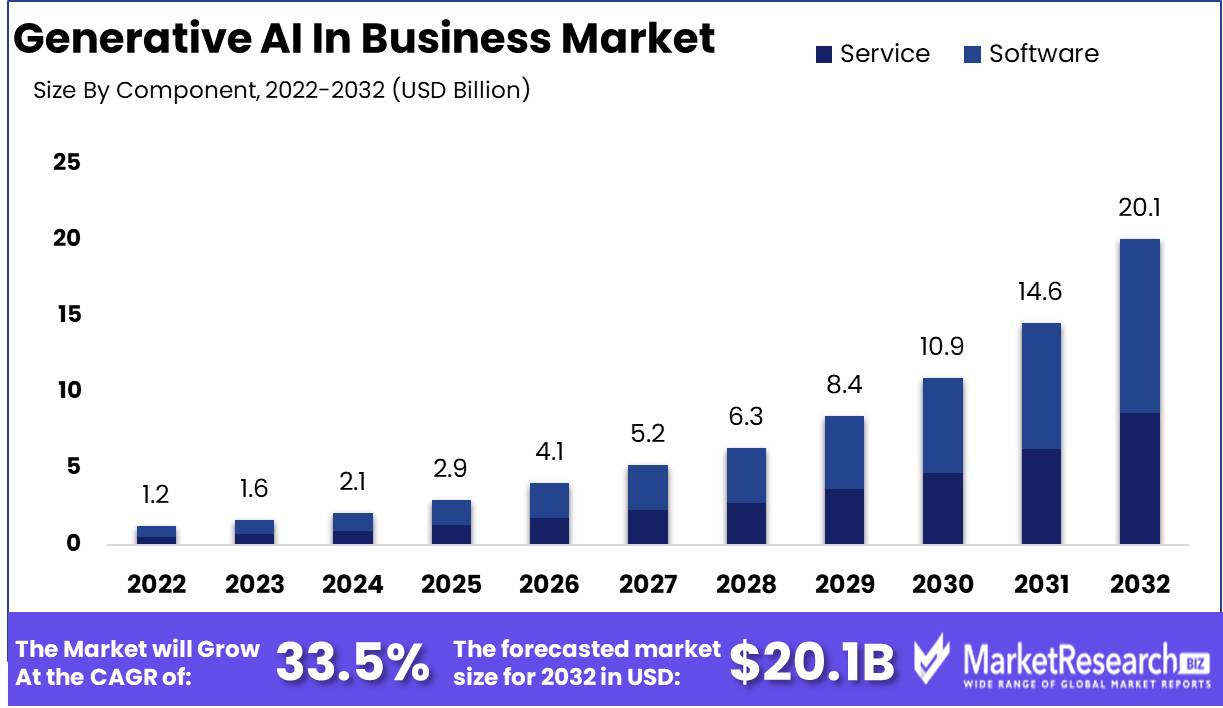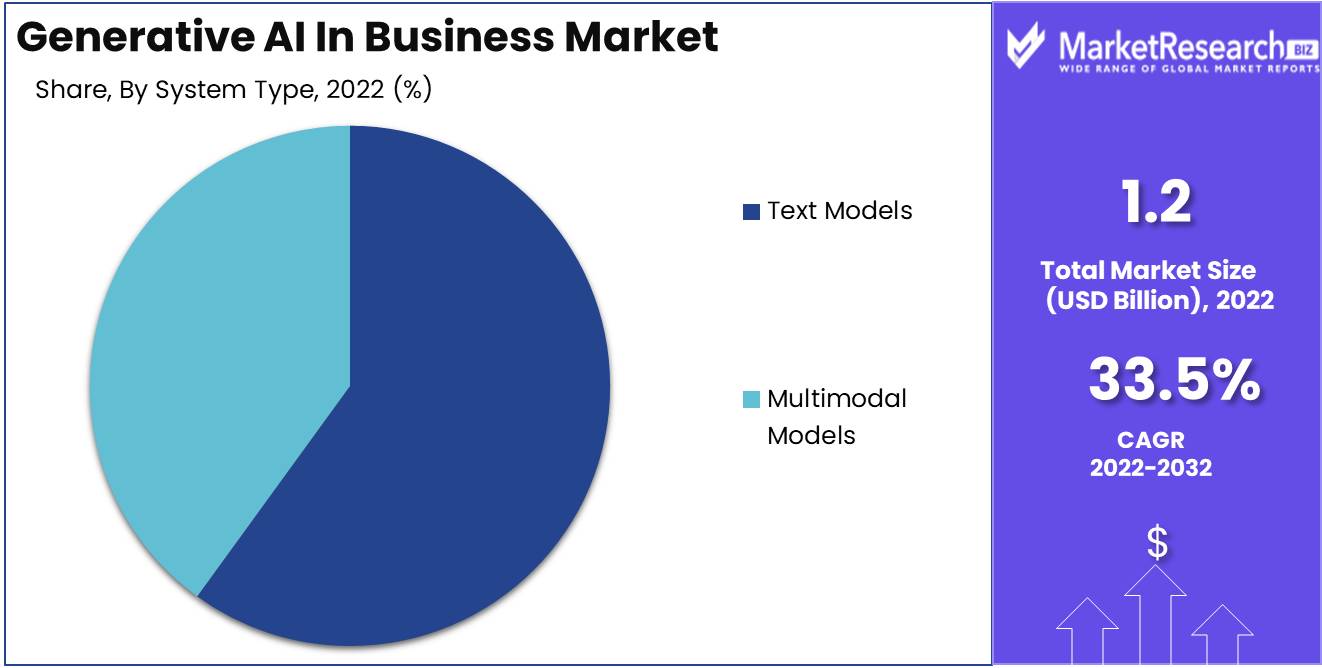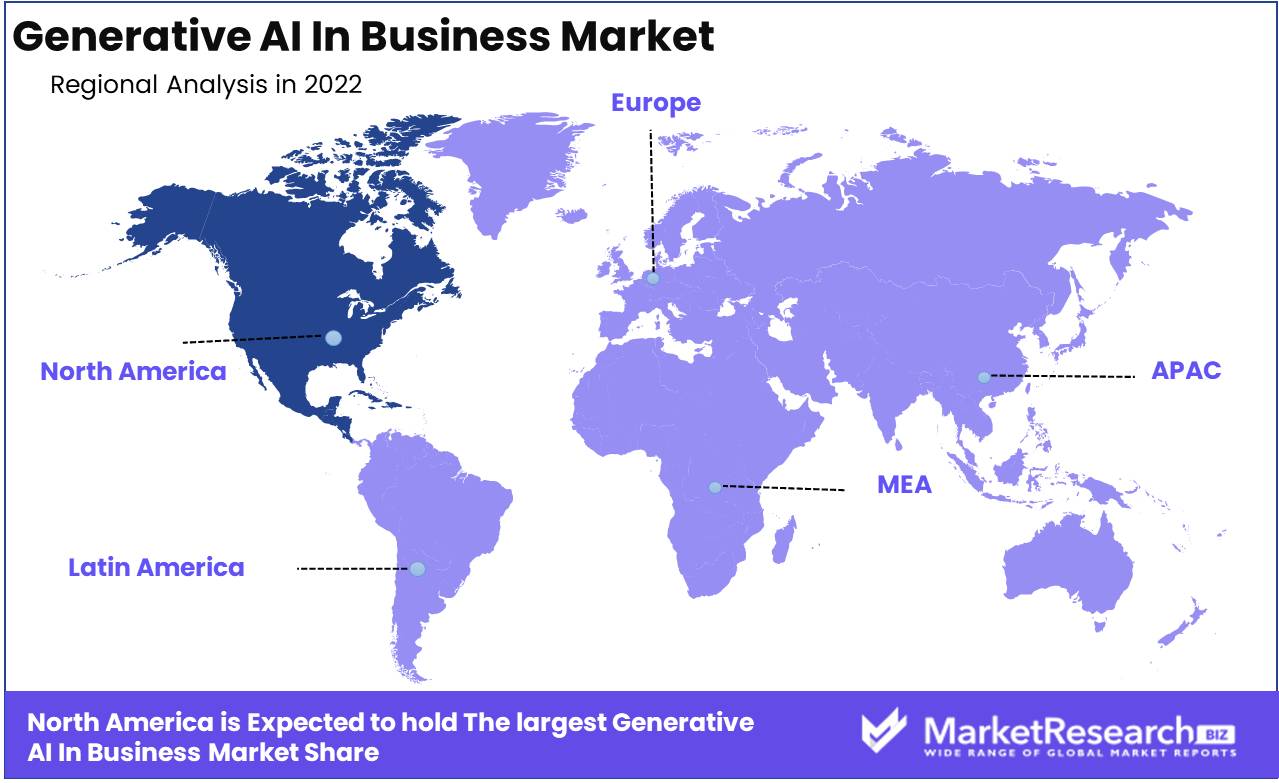
Generative AI In Business Market Based on Component (Service, Software), Based on System Type (Text Models, Multimodal Models), Based on End-Use (BFSI, Manufacturing, Customer Support, Others), By Region And Companies - Industry Segment Outlook, Market Assessment, Competition Scenario, Trends, And Forecast 2023-2032
-
38942
-
July 2023
-
160
-
-
This report was compiled by Vishwa Gaul Vishwa is an experienced market research and consulting professional with over 8 years of expertise in the ICT industry, contributing to over 700 reports across telecommunications, software, hardware, and digital solutions. Correspondence Team Lead- ICT Linkedin | Detailed Market research Methodology Our methodology involves a mix of primary research, including interviews with leading mental health experts, and secondary research from reputable medical journals and databases. View Detailed Methodology Page
-
Quick Navigation
Report Overview
Generative AI In Business Market size is expected to be worth around USD 20.1 Bn by 2032 from USD 1.2 Bn in 2022, growing at a CAGR of 33.5% during the forecast period from 2023 to 2032.
Detailed analysis of the Generative AI in Business Market, including its definition, objectives, significance, and noteworthy innovations. We will investigate significant investments and the incorporation of Generative AI into a variety of products and services, as well as its rapid expansion and diverse applications. Generative AI is a category of algorithms that learn directly from data rather than through explicit programming. It attempts to generate new and unique content by simulating patterns and traits observed in the training data. The ultimate objective of Generative AI is to generate content that cannot be distinguished from what a human could produce.

The significance and benefits of Generative AI are immense and incontestable. Businesses can use this technology to generate innovative ideas, design one-of-a-kind products, and even simulate human-like conversation due to its capacity to generate realistic and compelling content. By simulating creativity, Generative AI enables businesses to consolidate processes, increase efficiency, and investigate new business opportunities.
Significant advancements in the field of Generative AI in Business Market have generated a great deal of exhilaration and interest. From producing convincing images and videos to composing music and writing literature, these innovations have pushed the limits of what was once unimaginable. The invention of deepfake technology, which enables the synthesis of hyper-realistic features and speech, is a notable example. These innovations have captivated industries including advertising, entertainment, and even healthcare, transforming how we perceive and interact with content.
Generative AI in Business Market has seen a surge in investments and the resultant incorporation of the technology into a vast array of products and services. Generative AI has been integrated into cutting-edge products and services, ranging from creative tools for designers and artists to e-commerce customer recommendation systems. In numerous industries, the growth potential and applications of Generative AI are staggering. Generative AI is being utilized by industries such as fashion, architecture, and product design to create distinct and customized offerings.
Driving factors
Automation of Operations
Automation has become a pillar of productive business operations. Businesses can save time, reduce human error, and streamline processes by automating repetitive duties. By utilizing machine learning algorithms to analyze immense quantities of data and generate insights in real-time, generative AI elevates automation to the next level. This enables businesses to automate previously inconceivable complex decision-making processes and optimize operations in unprecedented ways.
Superior Data Analytics
Data is the essence of modern enterprises, and effective data utilization provides a significant competitive advantage. Businesses can harness the power of large data and make sense of it with the help of generative AI. Businesses can discover patterns, trends, and insights that would be impossible to detect manually using advanced data analytics techniques. Utilizing Generative AI for data analytics enables businesses to make data-driven decisions, identify consumer preferences, and optimize their strategies for optimal profitability.
Individualized Customer Interactions
In today's competitive market, businesses must provide customized consumer experiences. Companies can now comprehend customer behavior, preferences, and requirements on a personal level thanks to generative AI. AI algorithms can generate personalized recommendations, customized marketing campaigns, and targeted advertising by analyzing customer data. This degree of customization not only increases customer satisfaction and loyalty, but also boosts sales and revenue for businesses.
Supply Chain Effectiveness
Supply chain management is a crucial aspect of any business, and optimizing it can result in substantial cost savings and increased productivity. Generative AI assists companies in analyzing their supply chain data, identifying bottlenecks, and streamlining processes. Using AI-driven predictive models, businesses can optimize inventory management, demand forecasting, and logistics, resulting in cost savings and enhanced consumer satisfaction. Businesses can achieve operational excellence and obtain a market advantage through the optimization of their supply chains using AI.
Restraining Factors
Job Displacement Concerns
Employment displacement is one of the primary concerns encircling the adoption of Generative AI in Business Market. While it is true that certain repetitive duties can be automated or streamlined using AI technology, this does not inherently result in a substantial loss of employment. Instead, it affords employees the chance to transition into more strategic and innovative positions within the organization.
Opposition from Employees
Resistance from employees is a natural reaction to the introduction of new technologies, particularly AI. Staff members can experience apprehension and resistance when they anticipate being supplanted or rendered obsolete. Businesses must proactively address these concerns and communicate the benefits and opportunities that generative AI can offer.
Integration Challenges
Integrating generative AI technology into existing systems and processes can present obstacles that must be navigated with care. During the integration process, compatibility issues with legacy systems, data interoperability, and technical complexities may arise. A strategic approach and collaboration between IT departments, developers, and other stakeholders are required to overcome these obstacles.
Ethics-Related Factors
As the sophistication of generative AI technology increases, ethical considerations become increasingly essential. Transparency, accountability, and protection against bias are essential for establishing stakeholder trust. Businesses must establish explicit ethical guidelines and frameworks to regulate the use of generative artificial intelligence.
Covid-19 Impact on Generative AI In Business Market
As the world navigates through these unprecedented times, the COVID-19 pandemic poses a monumental challenge. Generative AI in Business Market has been substantially affected, just like every other industry. In this article, we intend to provide a comprehensive analysis of COVID-19's effects on this swiftly developing industry.
The spread of COVID-19 has wreaked havoc on the global economy and generated considerable uncertainty. Companies across the globe have been confronted with unprecedented obstacles, compelling them to swiftly adapt to the changing business environment. The effect on Generative AI in Business Market has been profound and multifaceted.
The pandemic has accelerated the rate at which industries are undergoing digital transformation. Companies that previously relied on conventional methods and obsolete technologies have been compelled to implement contemporary solutions in order to remain competitive. Generative AI has emerged as a key driver of this transformation, providing organizations with the ability to automate repetitive tasks, generate creative solutions, and adapt to swiftly changing consumer requirements.
Lockdown measures and social distancing have compelled individuals and businesses to develop novel methods of communication and engagement. Generative AI platforms have become a valuable resource for the production of original and creative content. Despite the constraints imposed by the pandemic, generative AI has enabled individuals and organizations to investigate uncharted territories and liberate their creativity in fields ranging from virtual art galleries and fashion design to music composition and advertising campaigns.
Component Analysis
Generative AI refers to the use of algorithms and models to create new and original content that mimics human-like creativity. This technology has found numerous applications in various industries, particularly in the business sector. In the generative AI in business market, the software segment has gained significant prominence and dominates the industry. The software segment in the generative AI in business market has experienced substantial growth and is expected to continue its dominance in the coming years.
This segment encompasses the software applications and platforms that enable businesses to leverage generative AI for various purposes. These software solutions provide businesses with the ability to generate creative content, make informed decisions, and optimize their operations. The software segment's dominance is primarily attributed to its versatility and wide range of applications across different industries. Consumer trends and behaviors also play a crucial role in driving the adoption of the software segment in the generative AI in business market. Consumers today demand personalized and tailored experiences, and businesses are responding to these preferences by leveraging generative AI.
System Type Analysis
Within the generative AI in business market, the text model segment has emerged as the dominant system type. Text models refer to the use of AI algorithms and techniques to generate textual content that resembles human writing. This system type has gained significant traction across industries due to its ability to automate content creation, improve customer engagement, and enhance communication.
Consumer trends and behaviors also influence the adoption of the text model segment in the generative AI in business market. Today's consumers are inundated with information and have limited attention spans. Businesses need to capture their attention and deliver relevant content quickly. The text model segment enables businesses to create engaging and persuasive content that resonates with their target audience. By leveraging the power of AI algorithms, businesses can generate high-quality and relevant textual content that drives customer engagement and enhances brand loyalty. The text model segment is expected to register the fastest growth rate over the forthcoming years due to several factors.

Key Market Segments
Based on Component
- Service
- Software
Based on System Type
-
- Text Models
- GPT-3
- LaMDA
- LLaMA
- Multimodal Models
- GPT-4
- DALL-E
- Stable Diffusion
- Progen
- Text Models
Based on End-Use
-
-
- BFSI
- Manufacturing
- Customer Support
- Content Writing
- IT & Telecommunication
- Healthcare
- Automotive & Transportation
- Retail Industry
- Other End Uses
-
Growth Opportunity
Collaboration of AI and personnel
The successful integration of AI systems with human knowledge has emerged as a key factor in generating growth and maximizing the potential of generative AI in the business market. Instead of replacing workers, AI technology has the potential to augment their abilities and facilitate more efficient and well-informed decision-making. Through collaborative efforts, businesses can harness the power of AI algorithms to analyze and interpret immense quantities of data, thereby obtaining valuable insights that drive strategic initiatives.
Intelligent virtual assistants
The proliferation of AI-powered virtual assistants is another significant growth driver for the business market for generative AI. These intelligent digital companions, including chatbots and voice assistants, have transformed the consumer experience by providing real-time assistance and personalized interactions. By leveraging natural language processing and machine learning algorithms, AI-powered virtual assistants are able to comprehend and respond to customer inquiries, make product recommendations, and even provide customized solutions to complex problems.
Expansion in emerging markets
The expansion of the generative AI market into emergent markets amplifies the market's growth potential. As the rate of technological adoption increases in these regions, businesses are recognizing the transformative effect that generative AI can have on their operations. From streamlining supply chain management to optimizing resource allocation, generative AI offers organizations numerous opportunities to realize latent potential and obtain a competitive advantage.
Implementation of the Internet of Things (IoT).
The integration of generative AI with the Internet of Things (IoT) presents tremendous opportunities for enterprises around the world. By combining the power of AI algorithms with the immense network of interconnected devices, businesses can open up a new realm of possibilities. Generative AI can use IoT data to identify patterns, predict outcomes, and seamlessly optimize processes. In manufacturing environments, for instance, AI-powered algorithms can analyze real-time data from IoT sensors to forecast equipment failures, enabling proactive maintenance and minimizing delay.
Latest Trends
Chatbots Powered by AI for Customer Support
In the era of digital transformation, businesses must provide exceptional customer service. AI has paved the way for chatbots propelled by AI, which are revolutionizing interactions with customers. These intelligent programs employ AI algorithms to quickly comprehend and respond to consumer inquiries. AI-powered chatbots guarantee a seamless consumer experience due to their ability to provide contextual and personalized responses. This trend improves both customer satisfaction and operational effectiveness.
Demand Projection and Inventory Control
For businesses to optimize their supply chain operations, precise demand forecasting and effective inventory management are essential. Generative AI technologies are becoming increasingly integral to this field. Using machine learning algorithms, businesses can analyze historical data, customer behavior, market trends, and other relevant factors to make decisions based on data. This allows them to optimize their inventory levels, prevent stockouts, and reduce excess inventory.
For Feedback Analysis, NLP
Customer feedback is a priceless insight source for businesses pursuing continuous improvement. Nonetheless, manually analyzing immense quantities of feedback data is time-consuming and difficult. Powered by generative AI, Natural Language Processing (NLP) is transforming this process. Using NLP solutions powered by AI, businesses can automatically extract critical consumer feedback themes, sentiments, and patterns. This enables organizations to make decisions supported by data, to identify areas for improvement, and to increase customer satisfaction based on actionable insights.
AI-Powered Suggestions
For businesses, personalized recommendations have become a major driver of consumer engagement and revenue growth. Customer preferences, behavior, and purchase history are analyzed by AI-driven recommendation systems in order to generate personalized recommendations. By employing generative AI techniques, businesses can improve the precision and applicability of their recommendations. This enhances not only customer satisfaction, but also conversion rates and customer loyalty. Recommendations powered by artificial intelligence have proved to be a game-changer in a variety of industries, including e-commerce, entertainment, and media.
Regional Analysis
Generative AI In Business Market Is Predominately American. Global businesses are progressively adopting artificial intelligence (AI) to improve their operations and obtain a competitive edge in the current digital era. Among the various AI subfields, generative AI has emerged as a game-changing technology with enormous potential for business innovation and expansion. This article examines the dominance of North America in Generative AI in Business Market and the reasons for its unparalleled success.
In terms of Generative AI in Business Market, North America is unquestionably in the lead. Significant advances in AI research and development have occurred in the region, nurturing an environment conducive to innovation and entrepreneurial growth. Several factors contribute to the dominance of North America in this discipline. North America's technological infrastructure is unparalleled, with Silicon Valley in California serving as the epicenter of technological innovation. High-performance computing systems and other cutting-edge resources are available.
North America is home to prestigious educational institutions such as Stanford, MIT, and Harvard, as well as prominent research organizations such as OpenAI and Google Brain. These institutions attract dazzling minds and foster innovative AI research, propelling the region to the vanguard of technological advances. North America's dominance has been facilitated by the synergy between academia, industry, and government in promoting AI innovation.
The startup ecosystem in North America is flourishing, especially in cities like San Francisco and New York. The availability of venture capital funding, incubators, and accelerators encourages startups to investigate cutting-edge technologies such as generative AI and fosters an entrepreneurial culture. In addition to contributing to technological advancements, these ventures serve as industry-wide adoption catalysts.

Key Regions and Countries
North America
-
-
- US
- Canada
- Mexico
-
Western Europe
-
-
- Germany
- France
- The UK
- Spain
- Italy
- Portugal
- Ireland
- Austria
- Switzerland
- Benelux
- Nordic
- Rest of Western Europe
-
Eastern Europe
-
-
- Russia
- Poland
- The Czech Republic
- Greece
- Rest of Eastern Europe
-
APAC
-
-
- China
- Japan
- South Korea
- India
- Australia & New Zealand
- Indonesia
- Malaysia
- Philippines
- Singapore
- Thailand
- Vietnam
- Rest of APAC
-
Latin America
-
-
- Brazil
- Colombia
- Chile
- Argentina
- Costa Rica
- Rest of Latin America
-
Middle East & Africa
-
-
- Algeria
- Egypt
- Israel
- Kuwait
- Nigeria
- Saudi Arabia
- South Africa
- Turkey
- United Arab Emirates
- Rest of MEA
-
Generative AI in Business Market is used extensively in a variety of industries. Numerous key actors employ this technology to enhance their operations, enhance consumer experiences, and foster innovation. IBM's Watson AI platform is one of the most prominent competitors in this discipline. IBM uses its Generative AI capabilities to create sophisticated chatbots capable of engaging in realistic and meaningful conversations with customers, thereby enhancing customer support services.
Google is also a major participant in Generative AI in Business Market, using it to improve their image and speech recognition systems, allowing users to interact with their devices more effectively. In addition, organizations such as OpenAI are developing innovative applications of Generative AI in natural language processing, resulting in enhanced translation services and document summarization.
Also adopting Generative AI to detect fraud and anticipate market trends are financial institutions and fintech companies. For example, PayPal is utilizing this technology to enhance anti-money laundering measures and risk evaluations.
Top Key Players in Generative AI In Business Market
-
-
- Open AI
- Microsoft Corporation Company Profile
- Google LLC
- Genie AI Ltd.
- IBM Corporation
- MOSTLY AI Inc.
- Veesual AI
- Adobe Inc.
- Synthesis AI
- Paige.AI
- Rephrase.ai
-
Recent Development
-
-
- In 2023, Microsoft launched Azure Bot Service, an AI-powered tool that helps businesses create chatbots. This tool uses AI to understand user queries and provide accurate and real-time responses. It also allows businesses to automate customer interactions, optimize engagement, and bolster their overall customer support strategy.
- In 2022, Amazon introduced Amazon Lex, an AI-powered tool that enhances conversational AI experiences. This tool uses AI to convert speech to text, understand user intent, and respond with accurate and contextually relevant information.
- In 2021, Google unleashed Dialogflow, an AI-powered tool that streamlines conversational AI agents. This tool uses AI to build sophisticated and context-aware chatbots. It offers a user-friendly development environment, making it accessible even to non-technical users.
- In 2020, IBM Watson presented Watson Assistant, an AI-powered tool that enables conversational AI applications. It is used to create interactive and intelligent chatbots that can answer questions, provide recommendations, and handle customer issues.
-
Report Scope:
Report Features Description Market Value (2022) USD 1.2 Bn Forecast Revenue (2032) USD 20.1 Bn CAGR (2023-2032) 33.5% Base Year for Estimation 2022 Historic Period 2016-2022 Forecast Period 2023-2032 Report Coverage Revenue Forecast, Market Dynamics, COVID-19 Impact, Competitive Landscape, Recent Developments Segments Covered Based on Component (Service, Software)
Based on System Type (Text Models, Multimodal Models)
Based on End-Use (BFSI, Manufacturing, Customer Support, Content Writing, IT & Telecommunication, Healthcare, Automotive & Transportation, Retail Industry, OthRegional Analysis North America – The US, Canada, & Mexico; Western Europe – Germany, France, The UK, Spain, Italy, Portugal, Ireland, Austria, Switzerland, Benelux, Nordic, & Rest of Western Europe; Eastern Europe – Russia, Poland, The Czech Republic, Greece, & Rest of Eastern Europe; APAC – China, Japan, South Korea, India, Australia & New Zealand, Indonesia, Malaysia, Philippines, Singapore, Thailand, Vietnam, & Rest of APAC; Latin America – Brazil, Colombia, Chile, Argentina, Costa Rica, & Rest of Latin America; Middle East & Africa – Algeria, Egypt, Israel, Kuwait, Nigeria, Saudi Arabia, South Africa, Turkey, United Arab Emirates, & Rest of MEA Competitive Landscape Open AI, Microsoft Corporation Company Profile, Google LLC, Genie AI Ltd., IBM Corporation, MOSTLY AI Inc., Veesual AI, Adobe Inc., Synthesis AI, Paige.AI, Rephrase.ai Customization Scope Customization for segments, region/country-level will be provided. Moreover, additional customization can be done based on the requirements. Purchase Options We have three licenses to opt for: Single User License, Multi-User License (Up to 5 Users), Corporate Use License (Unlimited User and Printable PDF) -
-
- Open AI
- Microsoft Corporation Company Profile
- Google LLC
- Genie AI Ltd.
- IBM Corporation
- MOSTLY AI Inc.
- Veesual AI
- Adobe Inc.
- Synthesis AI
- Paige.AI
- Rephrase.ai




